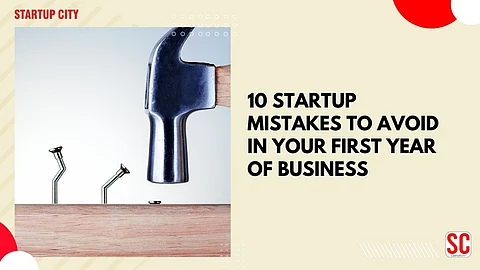

Startup Mistakes
Let me be honest with you: the first year of running a startup is like walking a tightrope during a thunderstorm — thrilling, terrifying, and full of lessons you didn’t even know you needed.
You’ve got the passion. The product. Maybe even the funding. But one wrong move can set you back months — or worse, sink your startup.
In my experience mentoring early-stage founders and interacting with over 100 young CEOs at Startup City India, I’ve noticed a recurring pattern. It’s not the lack of talent or innovation that kills most startups — it’s the avoidable mistakes.
Let me show you how to sidestep the most common traps.
"Fall in love with the problem, not your solution." – Uri Levine, Co-founder of Waze
It’s tempting to dive straight into product development because it feels productive. But building something nobody wants is the most expensive mistake you can make.
Talk to your target audience early.
Run a minimum viable product (MVP) test.
Use platforms like Google Trends or social listening to validate demand.
Ask yourself: Are you solving a problem that people are willing to pay for — or just a cool idea that sounds nice on paper?
We wear many hats as founders — but trying to wear all of them can burn you out fast.
I’ve seen founders become the marketer, designer, coder, salesperson, and accountant — all at once.
You lose focus on strategy and vision.
Quality suffers.
Burnout creeps in before you hit product-market fit.
Delegate or outsource tasks that don’t need your direct involvement.
Build a founding team with complementary skill sets.
Remember, investors don’t just bet on ideas — they bet on teams.
This is one of the silent killers. You can be profitable on paper and still run out of cash.
Overhiring in early months
Locking up capital in unnecessary tools or office space
Relying too heavily on future funding rounds
Tip: Use the “runway formula” — Divide current cash by monthly burn rate. If it’s less than 6 months, you’re in the danger zone.
If your answer to “Who is your customer?” is “Everyone,” we need to talk.
Without a niche, your marketing is vague.
You can’t speak to pain points effectively.
Conversion rates suffer.
Define your Ideal Customer Profile (ICP) by age, industry, location, behaviors, and pain points.
“Done is better than perfect.” — you’ve heard it before, but are you applying it?
Perfect is the enemy of launch.
Delayed feedback = delayed learning.
In one instance, a Bangalore-based startup I advised delayed launching their app by 6 months chasing perfection — only to pivot a week after launch based on real user feedback.
Launch. Learn. Improve. Repeat.
Most early-stage startups treat branding like a luxury. Big mistake.
Your brand builds trust.
It’s your first impression online.
It differentiates you from the noise.
Craft a compelling brand story.
Invest in a clean logo, messaging, and consistent visual identity.
Own your voice — whether it’s fun, formal, bold, or youthful.
It’s not exciting, but it’s essential.
Missing out on basics like GST registration, founders' agreements, NDAs, or IP protection can cost you dearly later.
Founders’ agreement
Company incorporation
Trademark application
Basic contracts with freelancers or vendors
Pro Tip: Use tools like LegalWiz or VakilSearch to simplify these processes in India.
Remember, your first idea is rarely your best one. Be ready to evolve based on market feedback.
Stagnant growth despite marketing efforts
Users not engaging with core features
New trends reshaping your industry
Example: Did you know that Slack started as a gaming company? The game failed, but the internal messaging tool became their billion-dollar pivot.
You can build the world’s best product, but if no one knows about it, does it really exist?
Start building your audience before your product is live.
Use content marketing, email lists, SEO, and LinkedIn to generate early buzz.
Data Check: According to HubSpot, startups that blog generate 67% more leads than those that don’t.
You don’t know everything. And that’s okay.
Startups that don’t listen usually end up solving the wrong problems — or solving the right ones in the wrong way.
Regular check-ins with customers
Monthly internal team retrospectives
Social media listening and survey tools
Listening is your fastest path to product-market fit.
Imagine this: You’re one year into your startup. You’ve made bold decisions, faced a few setbacks, but avoided the biggest traps that ruin most early-stage ventures. You’re lean, learning, and building real traction.
That’s where I want you to be.
Building a startup is hard. But it’s also the most rewarding journey you’ll ever take. Mistakes are part of the game — but if you’re aware of them early, you can steer your ship with confidence.